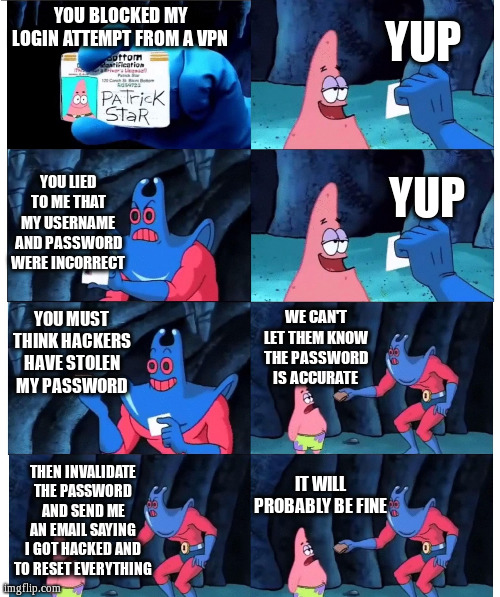I use ProtonVPN for everything, and I’ve started noticing more and more sites simply blocking me if I try to connect to them through ProtonVPN. As much as it sucks, I’ve more or less become acclimated to having to deal with an increased number of captchas while using a VPN; but I’m pretty angry about being blocked outright. There are at least two broad blocking tactics. First, some sites will say that my network traffic looks suspicious and/or that they simply block traffic from certain IP addresses. But second, and far more maddeningly, some sites tell me that my username and password combo are incorrect when I’m using a VPN. But I know this to be a blatant lie because (1) I use a password manager that auto-fills login forms with credentials that match the domain name, and (2) such sites accept my credentials when I visit them without the VPN connection.
What the hell can we do about this shit? Do I have to run my own VPN to avoid sharing an IP address with other people and thus getting blocked? I really don’t want to do that because I have neither the time nor expertise, and I like that connecting through a VPN provider makes my IP address much less significant. I’m aware that this is connected to the broader conversation about WEI and other methods for determining whether requests are legitimate or not, and I’m sure that businesses of all sizes are reeling from massive increases in bot and AI activity. But solutions that end up punishing legitimate users are not good or valid solutions.
far more maddeningly, some sites tell me that my username and password combo are incorrect when I’m using a VPN

Tbf, the banks knows your information is correct and you’re using a vpn.
This is the banks way of saying " hey jackass turn off your VPN and come back…"
I suspect many people who run vpns full time, constantly forget to turn them off…
The real solution is to avoid these sites when possible
But this practice tells you what we all needed to know… They won’t serve u unless they can track you.
Vote with us feet cattle
I don’t know if it even works, but have you considered relying on their Stealth protocol? While its absence on Linux (and Windows) means that you might not even be able to make use of it in the first place, I’m still interested to know if it makes any difference.
deleted
Oh, this is great! I didn’t know about the Stealth protocol. It’s helped me log into at least one previously stubborn site! Thanks for sharing! 💯
You can’t hide behind a VPN and access the entirety of the net. There will always be some site that will block you. It’s just par for the course. Unwinnable battle.
I use a Firefox container tied to a socks proxy on my router to bypass VPN for tricky sites. Yeah I know not the answer you’re looking for but some things have to be done (banking, health insurance) and if they already know my home address there’s little reason to hide the IP address
Solution: run your own VPN on a VPS. Write a configuration file/script to rotate IPs/machines so you’re not stuck on one IP all the time.
Vultr and DO have hourly pricing and a good API for one to do so
Try the new stealth protocol. Never have any issues :)
We wouldn’t need VPNs in the first place (for the modern use cases) except that security and IT guys started blocking or limiting content based on user IP address.
That needs to stop entirely, it’s a defective feel good security measure that is easily defeated by an attacker willing to spend a few bucks for a new IP.
Fortunately VPN tech is very flexible, so there are ways to get yourself a dedicated IP that nobody else can use, solving the problem and defeating those IT guys.
Chain your vpn to another VPN that actually uses real domestic client IP’s then u just look like a normal user to webstites
Which VPN providers use domestic client IPs?
the every expensive botnet type



